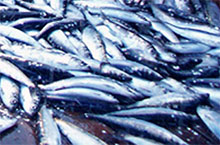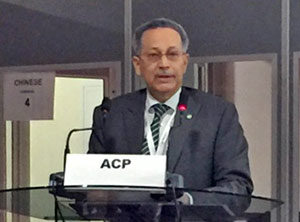ACP Group keen to secure robust multilateral rules on fisheries subsidies
 Nairobi, Kenya, 21 July 2016/ ACP: The Secretary General of the African Caribbean and Pacific (ACP) Group of States has called for an agreement for disciplines on fisheries subsidies in the World Trade Organisation, to ensure the sustainability of key marine resources on which many of the 79 ACP member states depend.
Nairobi, Kenya, 21 July 2016/ ACP: The Secretary General of the African Caribbean and Pacific (ACP) Group of States has called for an agreement for disciplines on fisheries subsidies in the World Trade Organisation, to ensure the sustainability of key marine resources on which many of the 79 ACP member states depend.
Reacting in support to the UNCTAD-FAO Joint Statement on regulating fisheries subsidies, ACP Secretary General Dr. Patrick Gomes said that such an agreement would be a major contribution by WTO members towards attaining one of the key targets of the 2030 Agenda for Sustainable Development.
“Harmful fisheries subsidies are part of the problem that is contributing to overcapacity and overfishing. Subsidies directed at fishing fleets that target a stock in an overfished state, or subsidies given to fishing entities involved in Illegal, Unreported and Unregulated (IUU) fishing, undermine the sustainability of fisheries resources… The ACP Group is keen on playing its part within the WTO framework in securing robust and enforceable multilateral rules providing for disciplines of fisheries subsidies,” he stated at the 14th session of the UN Conference on Trade and Development (UNCTAD XIV) held in Nairobi, Kenya.
According to the FAO, more than 30% of the world’s fish stocks are overfished. In fact, over the past four decades, the proportion of fish stocks fished within biologically sustainable levels fell from 90% in 1974 to 68.6 percent in 2013.
Harmful forms of fisheries subsidies remain one of the major factors that lead to such overfishing and depletion of fish stocks. Fisheries subsidies are estimated to be as high as US$35 billion worldwide, of which about US$20 billion directly contribute to overfishing as capacity-enhancing subsidies.
Goal 14 of the globally endorsed 2030 Agenda for Sustainable Development is exclusively dedicated to the conservation and sustainable use of oceans, seas, and marine resources. This marks the first time in which achieving sustainable management of fisheries and marine resources has been included in the global governance agenda.
This goal encompasses a specific target (SDG 14.6) to prohibit by 2020 those fisheries subsidies that lead to overcapacity and overfishing, to eliminate subsidies that contribute to illegal, unreported and unregulated (IUU) fishing and to refrain from adopting such subsidies.
“The ACP Group recognizes that fisheries subsidies that contribute to overfishing and overcapacity cause economic losses in the fisheries sector and creates serious distortions in global fish markets impacting food security and livelihoods. Therefore effectively addressing fisheries subsidies will deliver trade, economic, development and environmental benefits,” continued SG Gomes.
“Any disciplines on fisheries must take into account appropriate and effective special and differential treatment for ACP countries, including Small Island Developing States (SIDS), due to the importance of fisheries sector for their development and food security.”
The ACP Group backed the UNCTAD-FAO joint statement, which identified several minimum outcomes that could contribute to the members’ efforts to meet SDG Target 14.6, including:
· accurate, additional, practical and feasible provisions for the transparent notification of all relevant fisheries subsidies;
· clear prohibition of subsidies that contribute to overfishing and overcapacity, including subsidies linked to IUU fishing, and those that undermine sustainable development, food and nutritional security, jeopardizing the livelihoods of coastal populations;
· adequate and appropriate instruments and tools to deter introduction of new harmful subsidies; and
· special attention and treatment to developing countries, in particular, the least developed ones and Small Islands Development States (SIDS), so they can continue to use their marine resources sustainably.
The ACP Group of States include 79 member states, of which 37 are Small Island Developing States and 62 are full members of the WTO.
(Pictured above: ACP Secretary General Dr. Patrick I. Gomes)
– Press ACP
